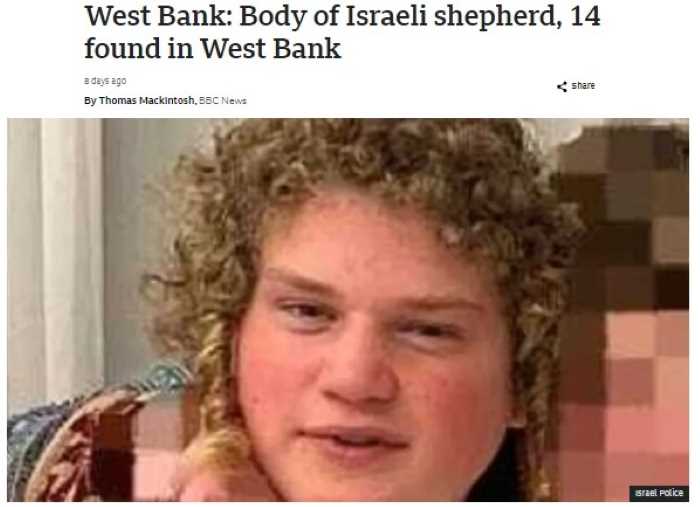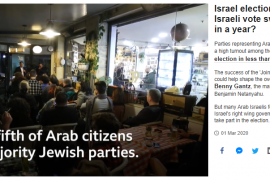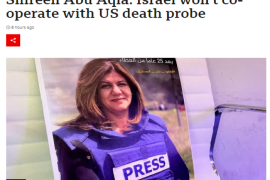Between April 13th and April 16th the BBC News website published three reports about the disappearance of a 14-year-old Israeli boy on April 12th, the discovery of his body the following day and related violent incidents.
Article 1: 13/4/24 “West Bank: Palestinian man killed after Israeli boy goes missing” by Laurence Peter and Lipika Pelham.
Article 2: 13/4/24 “West Bank: Body of Israeli shepherd, 14 found in West Bank” by Thomas Mackintosh.
Article 3: 16/4/24 “Deadly West Bank settler attacks on Palestinians follow Israeli boy’s killing” by Hugo Bachega (with Alaa Daraghme and Narinder Kalsi).
One notable feature of those three BBC reports is the lack of consistency in presentation of the name of the Israeli boy. In the first article he is named both as Benjamin Ahimeir and Benjamin Achimeir, in the second as Benjamin Achimeir and in the third report his name is presented as Binyamin Ahimeir.
One hundred and two words out of the first article’s 675 total words relate to what was at the time of writing a story about the disappearance of a 14-year-old. [emphasis in bold added]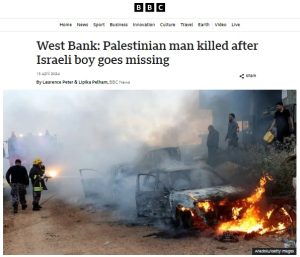
“Missing Benjamin Ahimeir, 14, has not been found. A huge search is under way.
Local media said the circumstances around the teenager’s disappearance were still unknown and the military was not sure if the incident was terrorism-related. Troops have set up roadblocks in the area.
Israeli media reported that Benjamin Achimeir had left “Gal Farm” in the settler outpost of Malachei Shalom early on Friday, and had not been seen since.
He had been grazing sheep, and the sheep returned to the farm without him, police said. His sister Hannah, quoted by AFP news agency, said he was familiar with the area.”
Of the second report’s 553 words, one hundred and fifty-four relate to the discovery of the boy’s body, with some of the information reproduced from the first article.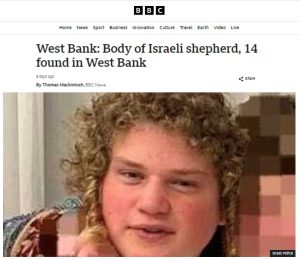
“Israel’s army says it has found the body of a 14-year-old shepherd in the occupied West Bank, a day after he went missing.
Benjamin Achimeir had taken a flock of sheep out to graze from Malachi Hashalom, a settler outpost near Ramallah on Friday morning.
PM Benjamin Netanyahu called Achimeir’s death a “heinous murder”. […]
Israeli media reported Achimeir left “Gal Farm” in the settler outpost of Malachei Shalom early on Friday, and had not been seen since.
He had been grazing sheep, and the sheep returned to the farm without him, police said.
Achimeir’s sister Hannah, quoted by AFP news agency, said he was familiar with the area.
“The heinous murder of the boy… is a serious crime,” Mr Netanyahu said in a statement reacting to the teenager’s body being found near Malachi Hashalom.
Israeli forces “are in an intensive pursuit after the heinous murderers and all those who collaborated with them”, he added.”
The third report is 936 words long, with just fifty-six of them relating to the murder of Binyamin Achimeir.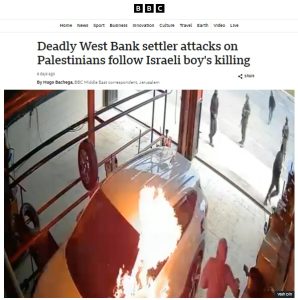
“The violence was triggered by the disappearance of 14-year-old Binyamin Ahimeir, who went missing on Friday after leaving his settler outpost to herd sheep near the Palestinian village of Mughayir, in the Ramallah area.
His body was found a day later, and the Israel Defense Forces (IDF) said he had been killed in a “terrorist attack”.”
As we see, BBC audiences were given relatively little information about the victim of this terror attack. Details such as his place of residence, his family, his place of study and his voluntary work with animals are absent from the BBC’s coverage.
All three of the BBC’s reports relate to the shooting of a man in the village of al-Mughayyir on April 12th.
Article 1:
“A Palestinian man has been killed in the occupied West Bank and 25 are reported hurt after dozens of Jewish settlers stormed a village during an Israeli search for a missing teenager.
Israeli troops intervened after dozens of settlers stormed al-Mughayyir armed with guns and stones.
It is not yet clear whether the man who died, Jehad Abu Alia, 26, was shot by an armed settler or Israeli soldier.” […]
“The father of Jehad Abu Alia, the 26-year-old who was shot, spoke from a hospital in Ramallah, where Jehad’s body had been taken. “My son went with others to defend our land and honour, and this is what happened,” Afif Abu Alia said.
The IDF says its troops, and not settlers, opened fire at stone-throwing Palestinians as “violent disturbances erupted at several points in the area”.
Troops managed to remove the settlers who had entered the village, it said.
“As of this moment, the violent riots have been dispersed and there are no Israeli civilians present within the town,” the IDF said.”
Article 2:
“A Palestinian man was shot overnight during an Israeli search for the teenager.
It is not clear whether the man – Jehad Abu Alia, 26 – was shot by an armed settler or an Israeli soldier.” […]
“Israeli troops later intervened. The Israel Defense Forces (IDF) says its troops, and not settlers, opened fire at stone-throwing Palestinians as “violent disturbances erupted at several points in the area”.
Troops managed to remove the settlers who had entered the village, it said.
“As of this moment, the violent riots have been dispersed and there are no Israeli civilians present within the town,” the IDF said.”
Article 3:
“Amid the search for the boy, dozens of settlers, some of them armed, raided Mughayir. They burned homes and cars, and killed a 25-year-old man named Jihad Abu Alia with a shot in the chest, according to Palestinian officials.”
As we see, despite the IDF’s statement and the documentation of rock-throwing by Palestinians which resulted in the injury of one of the soldiers, Hugo Bachega chose to present an alternative version of the incident.
The first and third articles also relate to additional incidents unconnected to the murder of Binyamin Achimeir and the related violence.
Article 1:
“Separately, Israeli forces shot and killed two West Bank Palestinians.
One was confirmed by Hamas to be a local commander of the group. The Israeli military say Mohammed Daraghmeh was killed in a shoot-out with their troops.”
Article 3:
“Across the West Bank, Israeli raids killed three Palestinians – 17-year-old Yazan Ishtayeh in Nablus on Monday, and Mohammad Shahmawi, 22, and Mohammad Rasoul Daraghmeh, 26, a suspected Hamas member, in Tubas on Friday.”
Bachega’s portrayal of Daraghmeh as a “suspected Hamas member” was already redundant at the time of writing.
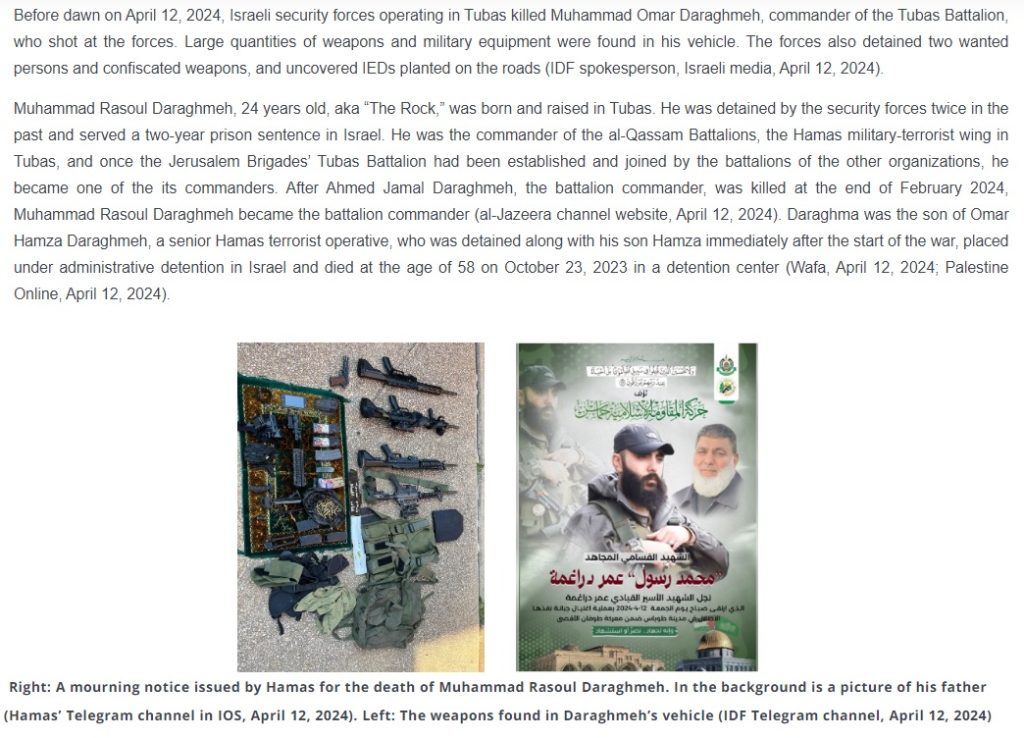
Bachega also refrains from informing BBC audiences that Mohammed Shahmawi was throwing an explosive device at Israeli troops at the time of his death on April 12th.
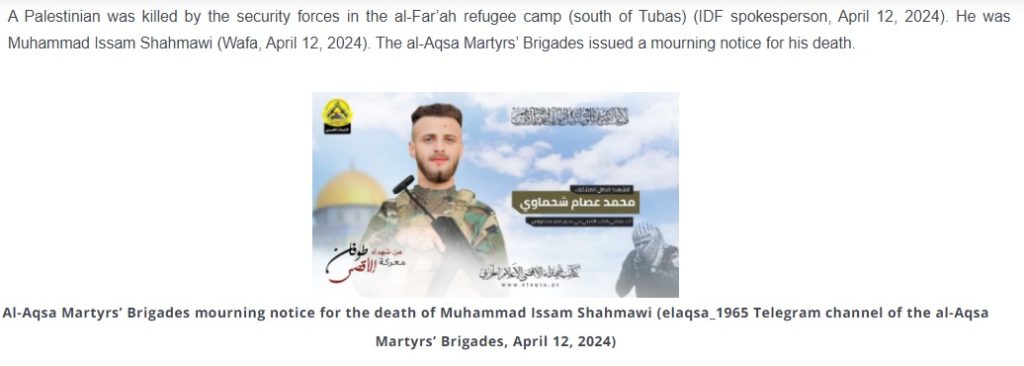
Yazan Ishtayeh (or Shtayyeh) was likewise attacking troops when he was killed on April 15th.
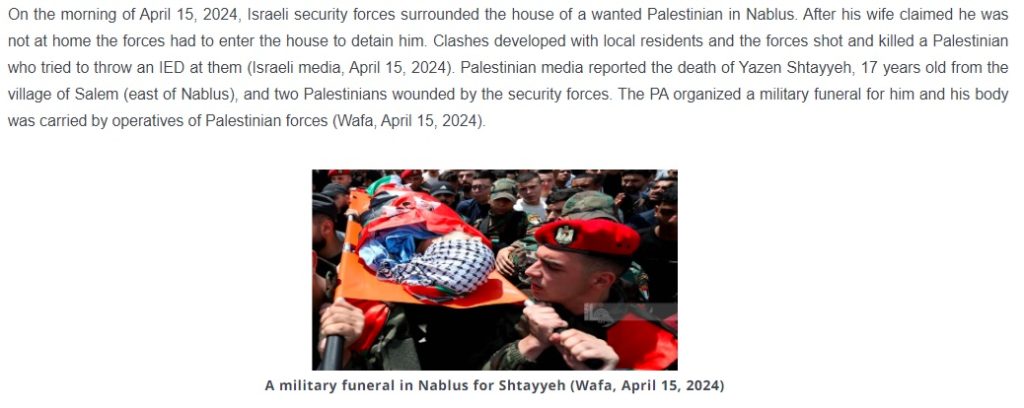
The first and third articles quote the political NGO ‘Yesh Din’ (including the use of a photograph in article 3) without any clarification of that organisation’s “affiliations, funding and particular viewpoints” as required by BBC editorial guidelines. Bachega’s report also cites ‘Peace Now’ and “the UN human rights office”, similarly without any relevant clarifications.
All three reports promote the BBC’s standard mantra concerning “international law”.
Article 1:
“Israel has built about 160 settlements housing some 700,000 Jews since it occupied West Bank and East Jerusalem in the 1967 Middle East war. The international community considers the settlements illegal, though Israel disputes this.”
Article 2:
“Israel has built about 160 settlements housing some 700,000 Jews since it occupied West Bank and East Jerusalem in the 1967 Middle East war. The international community considers the settlements illegal, though Israel disputes this.”
Article 3:
“Around 700,000 Israelis live in 160 settlements alongside 2.7 million Palestinians in the occupied West Bank and East Jerusalem, according to the settlement watchdog Peace Now.
Almost all of the international community regards the settlements as illegal, although Israel disputes this.
There are also about 160 so-called outposts, or small settlements which have been built without official approval and are considered illegal under Israeli law.”
All three reports relate to the topic of Palestinians killed during the past six months.
Article 1:
“The Palestinian health ministry says at least 460 Palestinians have been killed by Israeli forces or settlers in the West Bank since 7 October.”
Article 2:
“The Palestinian health ministry says at least 460 Palestinians have been killed by Israeli forces or settlers in the West Bank since 7 October.”
Article 3:
“Since then [Oct 7], more than 460 Palestinians have been killed in the West Bank, according to the Palestinian health ministry.
Those deaths includes [sic] armed fighters amid a rise in raids by the Israeli military on Palestinian towns and villages.”
While articles 1 and 2 fail to clarify that the number of Palestinians killed includes terrorists, perpetrators of terror attacks and males involved in acts of violence at the time, Bachega’s portrayal refrains from telling BBC audiences that the “rise in raids” is a response to a rise in Palestinian terrorism – most of which is not reported by the BBC.
Articles 1 and 2 provide uncritical amplification for Hamas supplied casualty figures which even Hamas admits are based on incomplete data.
Article 1:
“But the casualties there [Judea & Samaria] are dwarfed by the Gaza war: more than 33,600 Gazans, the majority of them civilians, have been killed during Israel’s campaign, the Hamas-run health ministry says.”
Article 2:
“More than 33,600 Gazans, the majority of them civilians, have been killed during Israel’s retaliatory campaign, the Hamas-run health ministry says.”
Articles 1 and 3 erase the number of victims of Hamas’ October 7th atrocities from audience view:
Article 1:
“On 7 October gunmen also took more than 250 people hostage. Israel says that of 130 hostages still in Gaza, at least 34 are dead.”
Article 3:
“Tensions were already high before 7 October, when Hamas launched a deadly attack on Israel, sparking the war in Gaza.”
In summary, out of a total of 2,164 words written by BBC reporters in three articles, just 312 related to the disappearance and murder of Binyamin Achimeir, with the second hand, unnecessarily punctuated, phrase “terrorist attack” appearing in just one of those BBC reports.

